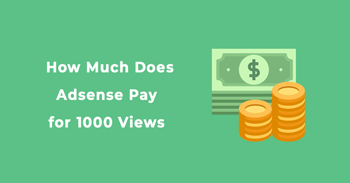The holy grail of SEO is finding low competition keywords to rank for. That becomes more challenging every year, with competition growing and huge brands like Forbes, Amazon, and Hubspot ranking in the top results for everything.
But, new opportunities show up every day!
There is always a new trend, a missed opportunity, or a long-tail keyword to target. With some good keyword research process, you can easily find keywords with enough search volume and low difficulty to rank for.
What are low competition keywords?
Low competition keywords are search queries with few or no websites actively targeting them, or where no high domain authority website or high-quality content exists.
Targeting these low-hanging fruits are great opportunities for SEO. They require less work, and can bring quick and easy results. They are also ideal for lower-authority websites starting out on SEO.
How to find low competition keywords?
Using a combination of tools, spreadsheets, and SEO analysis, you can uncover endless organic traffic opportunities with low difficulty scores.
With more than 7 years of experience in SEO for eLearning & SaaS at LearnWorlds, I have created my own process to evaluate keywords and prioritize lower competition ones.
In this article, I will be showcasing my latest process of finding low competition keywords and how to choose the right ones based on your business goals.
For your reference, I will be using the example of an ice cream producer.
Brainstorm relevant keywords
First, you need to brainstorm a list of “seed keywords”. Seed keywords are where your SEO strategy will take roots and grow!
Write down what you think your target audience might be searching.
Brainstorm Example
In my ice-cream factory, I would expect my customers to search for:
- Buy ice cream
- Order ice cream
- Best ice cream vendors
Expand your keywords list
Now that you have a few seed keywords ready, it’s time to expand this list to many more!
Our goal here is to create a long list of hundreds of potential keywords in order to find the least competitive ones.
Google Search Console (GSC)
Always start keyword search from your GSC. The data from the GSC is invaluable, as it offers the most reliable data on your website and it’s a competitive advantage that many of your competitors do not have.
Look for keyword phrases you are ranking after the 30th position and you have never written an article for. It means that competition is low, and even mentioning the keyword in a relevant article is enough to rank!
A good trick to start with GSC is to use regex to look for questions you are already ranking. Copy this code when filtering for Queries:
\b(Who|What|When|Where|Why|How)

Google auto-complete
It sounds obvious, but it’s not!
Many marketers do not use Google’s autocomplete function to enrich their SEO strategy. Google is giving us the most searched information and long-form queries for free.
Follow a few of the most relevant queries for you and click on search again, you will get many lists of long-tail keywords that you are not targeting already.

At the bottom of the search engine, you will find additional search suggestions, don’t forget to check those as well.

Adwords keyword planner
Google Keyword Planner is marketed as a tool for running ads, but it’s a very powerful tool for SEO as well.
And, by giving it my 3 seed keywords and asking for ideas, I get a list of keywords, their average search volumes and ads competition & price (cpc).
Why does it matter?
Because you see where the money goes and how competitive they are. Search Engine Marketing (SEM, PPC) and SEO go hand-in-hand, a low competition keyword in paid ads may be less competitive in organic results as well.
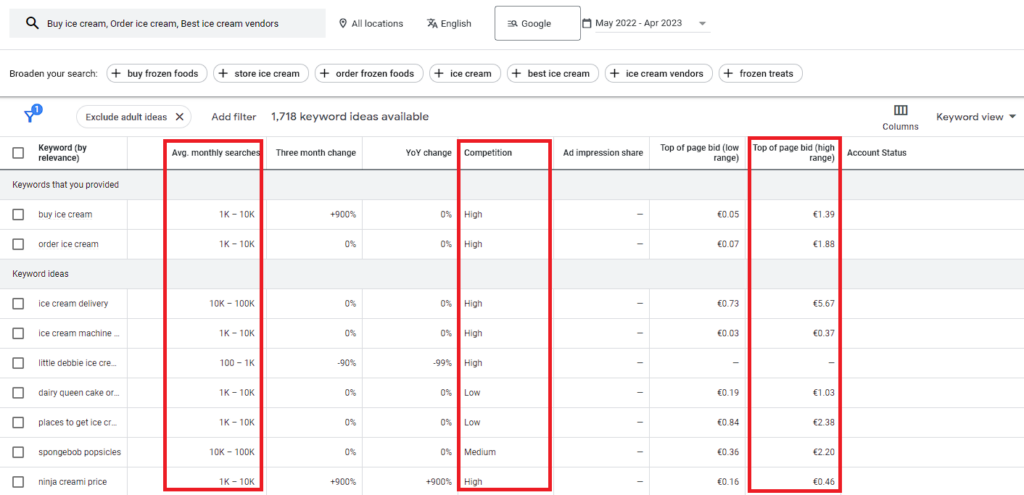
ChatGPT
Do you use A.I.? I do!
Describe your business and ask it to give you some keyword ideas. Artificial intelligence will not give you accurate results, but it’s incredibly good for brainstorming.
Ask ChatGPT to give you 100 keywords you could target and then choose the ones that make sense to you.
I like using GPT4 for writing content, but for brainstorming, the free GPT3.5 is more than enough.
Answer the Public
Answerthepublic.com is a great keyword research tool that “auto-completes” the query and gives you hundreds of possible keywords.
It will provide graphs with questions, prepositions, comparisons, alphabetical, related keywords, and related searches to the one you provided.

It also includes the difficulty and cost per click (CPC) for the keywords.
Also Asked
Similarly, AlsoAsked.com looks and threads Google’s featured snippet for “People Also Asked” questions. It’s a great way to find questions to answer or FAQs.

Keyword Sheeter
And, if you really want a high volume of ideas, I suggest the Keyword Sheeter tool, which takes Google’s Auto-complete to the next level!
I will be using these keywords for the evaluation example later on.

Ahrefs
Ahrefs is a paid tool, but well-worth it for finding new low competition keyword opportunities. Using Ahrefs’ Keyword Explorer, you can see a number of metrics and relevant keywords to your seed queries.
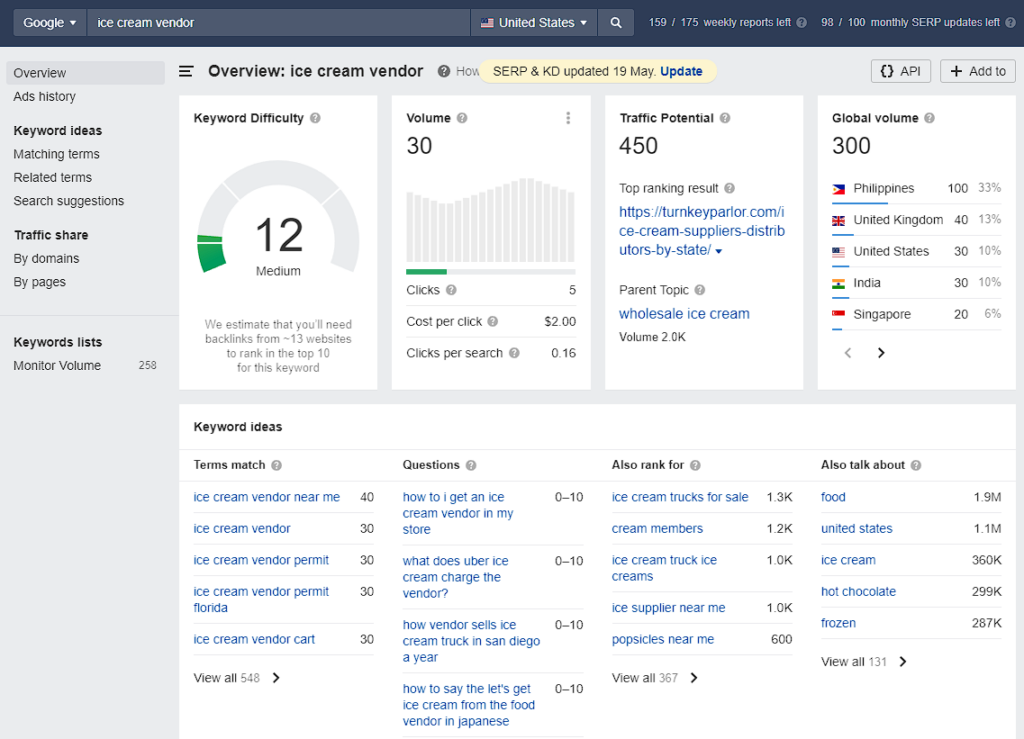
You can also look into your competitor’s keywords to find what they are ranking for and filter for high volume keywords but low competition. A great way to populate your list with potential keywords to target.
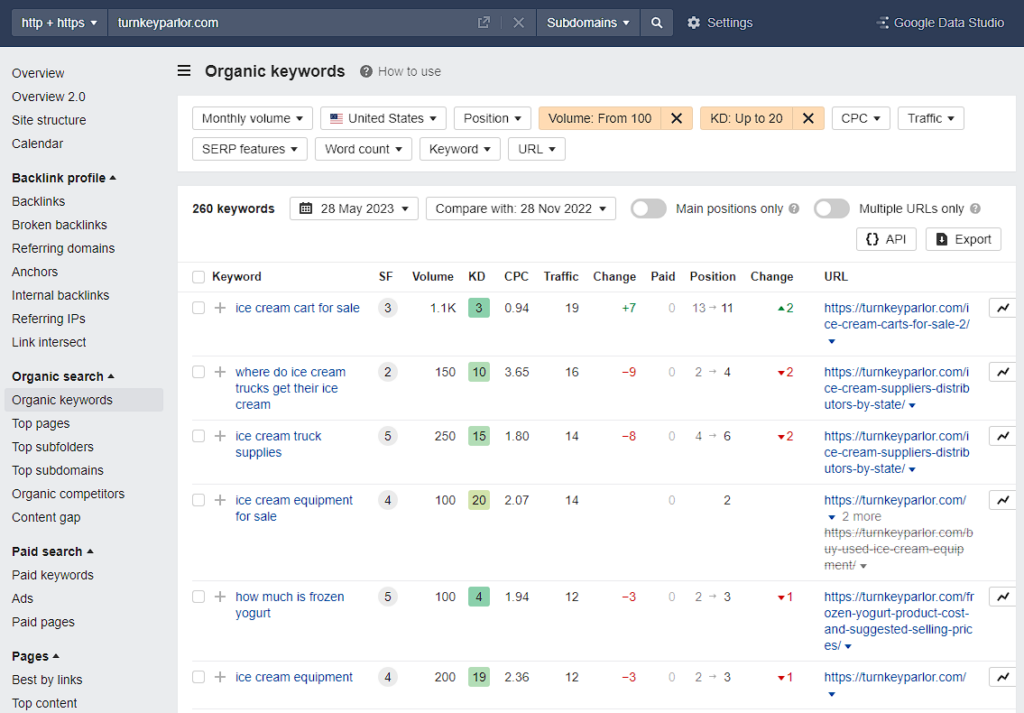
Ubersuggest
If you are looking for a free keyword research tool, Ubersuggest is decent enough, and also gives an SEO Difficulty metric as well. You can again filter out low search volumes and highly competitive keywords to find out opportunities.
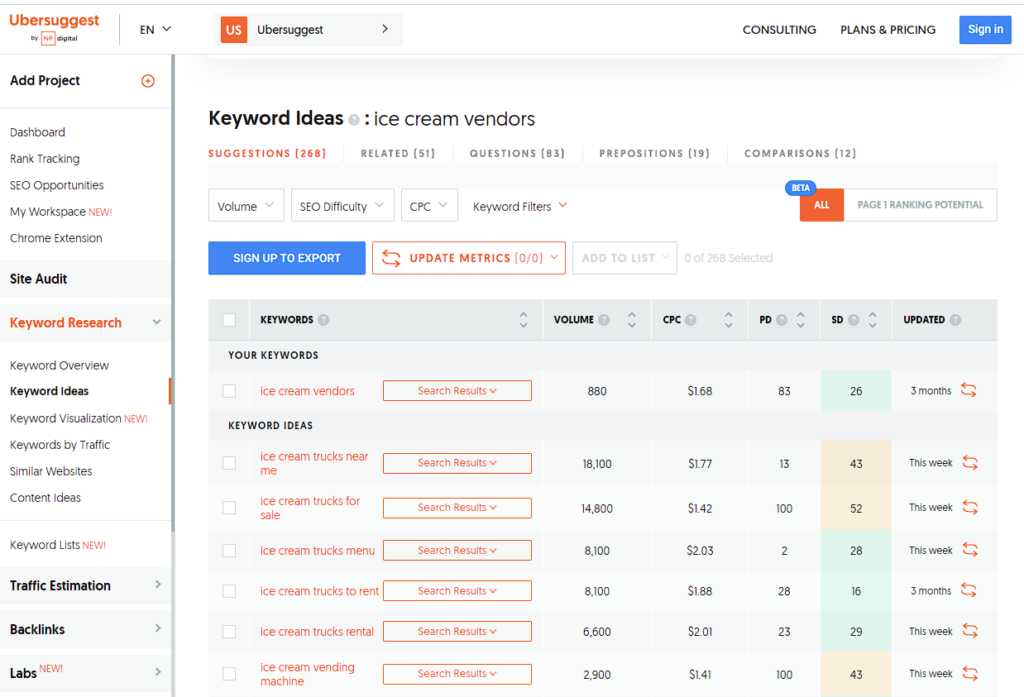
Identify the low competition keywords
How do you really identify low competition keywords to target?
That’s where SEO tools and some other methods come into play. But,first, let’s clear up something.
Keyword difficulty is a lie: Every keyword tool offers its own calculation for measuring keyword difficulty, organic search volumes, and rankings. No tool is perfect, and it’s only the beginning of your analysis. You will need a degree of manual checks and insight to shortlist the best keywords to target.
The most accurate tool is SEMrush. I do however suggest a combination of SEMrush and Ahrefs metrics. As both are paid tools, you can use Ubersuggest as a free alternative.
Export the results and import them to a spreadsheet. This way, you can see the information side-by-side and do some further analysis & filtering.

Metrics: Keyword Difficulty & Volume
Your north star metric is Keyword Difficulty.
However, do not forget to dig deeper and involve more metrics into your decision. By focusing on keyword difficulty alone on a particular keyword you might miss the bigger picture.
Keyword difficulty
For brand new websites, you would want to target keywords that show as 0-10 at Ahrefs or 0-20 at SEMrush.
Monthly Search Volume
There is no point in writing an in-depth article to bring 10 organic visits in a month, except if it’s a money-making keyword. Most website owners want to target keywords with hundreds or thousands of monthly searches.
Number of Results
I also like to see the number of results for a keyword. The less results in the SERPs, the less competition there is. It’s a good indicator of keyword competition and whether you can rank on the first page or not.
Website Authority of Competition
After making a short-list of keywords, I do suggest you take a look at the SERPs for each one manually.
For example, “superman ice cream where to buy” shows a difficulty of 7 if you see the SERPs, there are 3 websites with DR higher than 80 in the top results.
While not impossible, I would not expect to easily target the first position here.
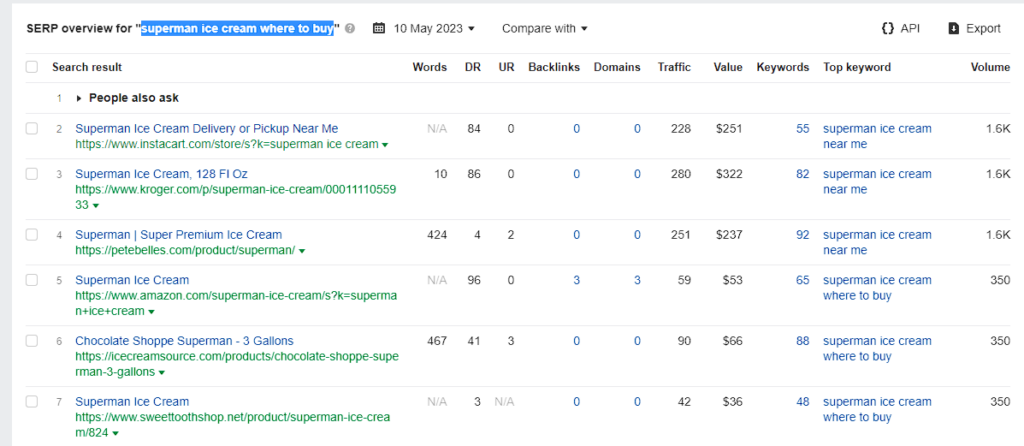
There are many cases where an “easy” keyword will have huge brands dominating the SERPs.
Ahrefs is a great tool for a quick overview of the SERPs. You can easily see how authoritative the top results are, the specific page, and how many backlinks does this page have. It also tells you how many other keywords it ranks and total value.
Remember, that you are not just targeting a keyword but a cluster or family of keywords. While we are looking at one keyword right now, you could be ranking for many more for a higher combined volume.
Your website authority
Your ability to target keywords without link-building is limited by your:
- Website authority
- Topical authority
- Content quality
All are very important factors when choosing to target search terms.
Website Authority: The higher your website’s authority, the higher difficulty keywords you can target with high search volumes. Start with targeting very low difficulty keywords and work your way up.
Topical Authority: You also have to keep in mind your topical authority. Do you write often for the topic? Do you rank for relevant keywords? Do you have brand recognition around the topic? If yes, your topical authority will be stronger and you can target higher difficulty keywords.
Content Quality: A longer, in-depth article might out-compete a thin-page, but AI-written content without editing or badly written pages will not fare well. Writing high quality, in-depth content will help you rank and target more difficult keywords.
Always check the content of the top competitors. How long it is, how deep, the media they used (image, video, sound), original research, and original perspective. If you can’t beat them at some of those, better avoid the topic.
Link-building: You can also target higher difficulty keywords if you can build a few links to your page (e.g. with link exchanges). Keywords might need 5,10, or 20 links to rank at a low difficulty and hundreds at higher ones.
That’s why manually checking which pages rank is a good indicator to know whether you can outcompete them.
Search Intent
Search intent is also an important indicator to know what to target. For me, SEMrush does this best as you can export in bulk keywords based on their search intent.
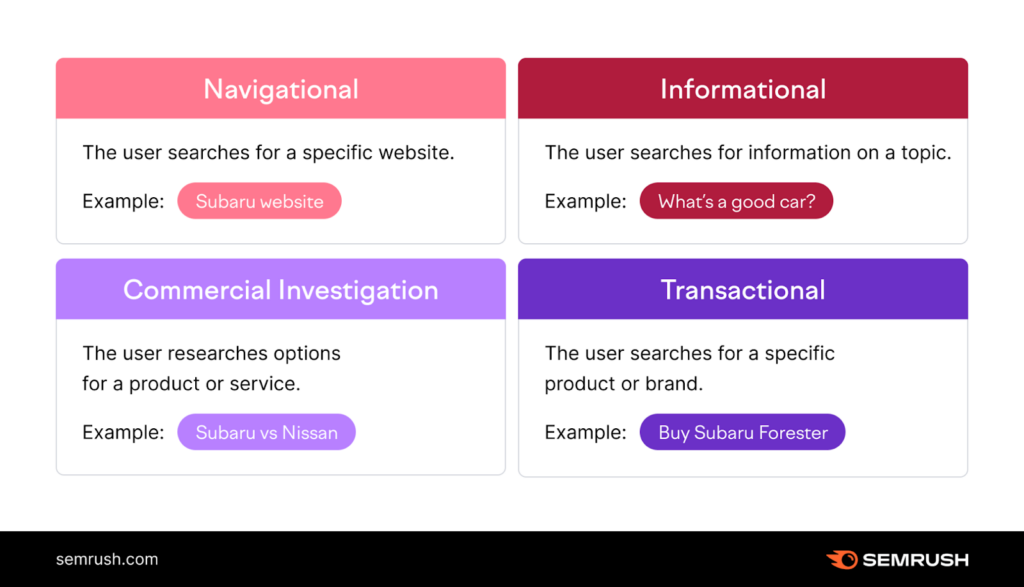
Depending on how you will monetize your website, you might prioritize informational or transactional & commercial keywords. The search traffic you are targeting should go hand-in-hand with your marketing strategy and monetization strategy!
An example for SaaS SEO, we tend to focus first on the bottom of the funnel, high-intent, and commercial or transactional keywords that bring conversions, before working into other kinds of content. This strategy brings money first to the company before focusing on top of the funnel content.
A final piece of advice
Finding low competition keywords is the best low-hanging fruit tactic in SEO and great for beginners and SEO experts alike. There are always opportunities that others missed or ignored.
A good SEO analysis can reveal incredible opportunities to monetize your site, lead capture, or sell more products.
In this kind of analysis, tools are very important, but avoid putting a lot of faith in them. Use them to find and filter opportunities only.
Your own insight and data, as well as information from the GSC are your real competitive advantage.
From time to time, try to also target zero-volume keywords based on insights from your customers, communities, forums, your own research, or other sources. Writing useful content for your audience, no matter their keyword or search engine optimization can also bring unexpectedly good results.
Many times, a tool will not show volume for a keyword and no one will target it, be the first to cover that query and beat your competitors!




